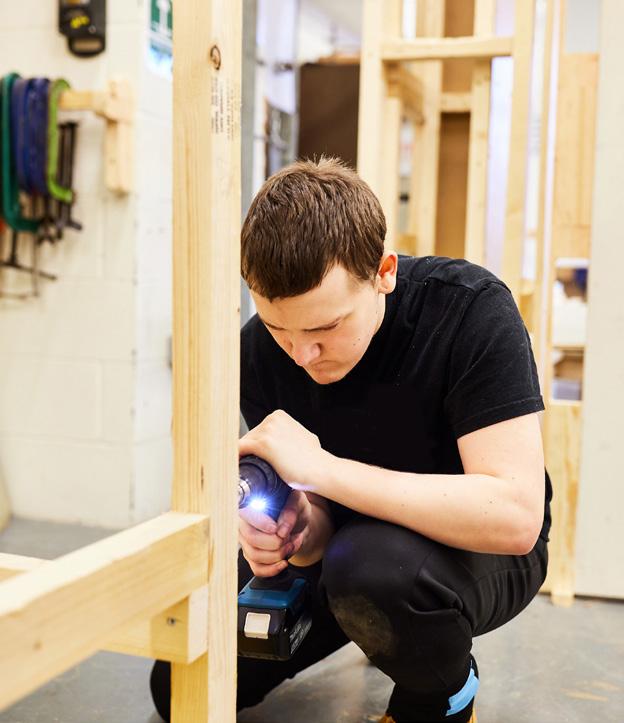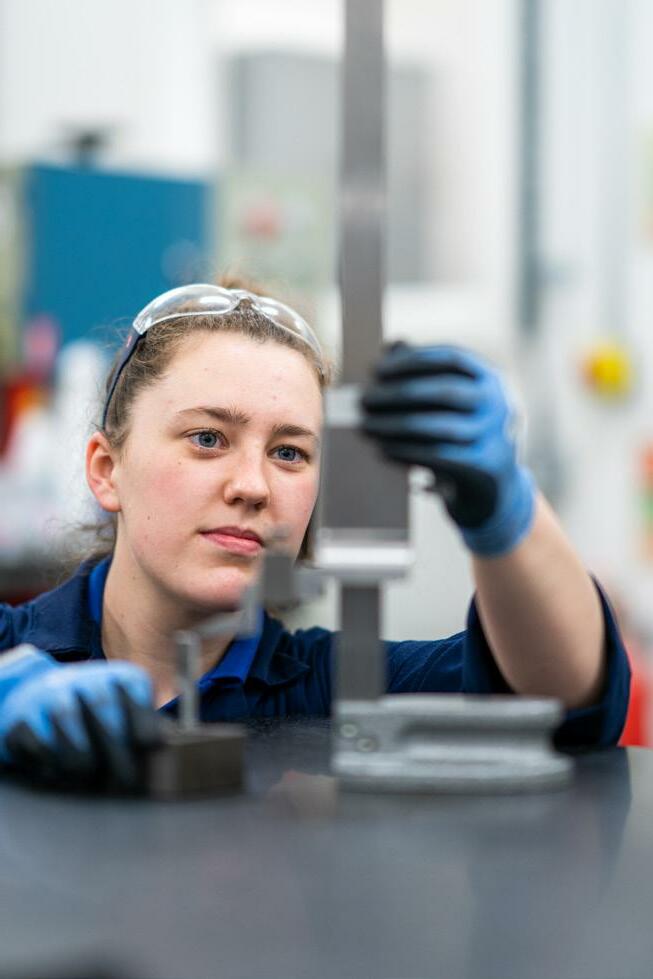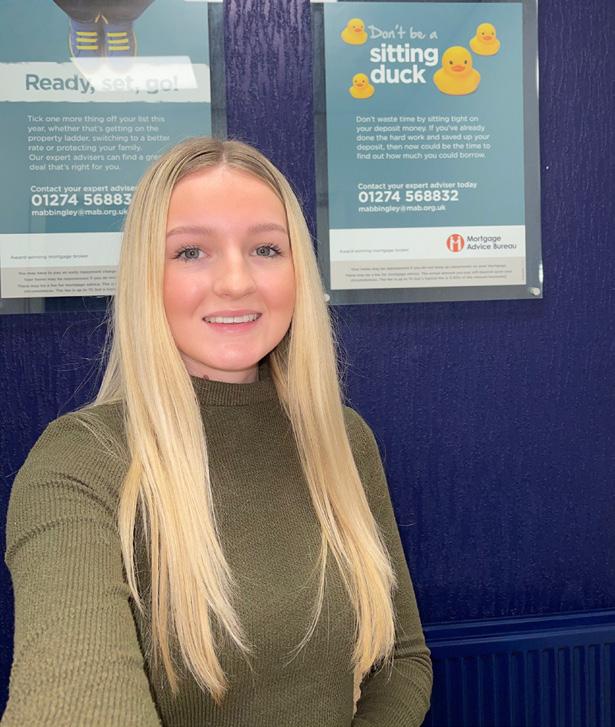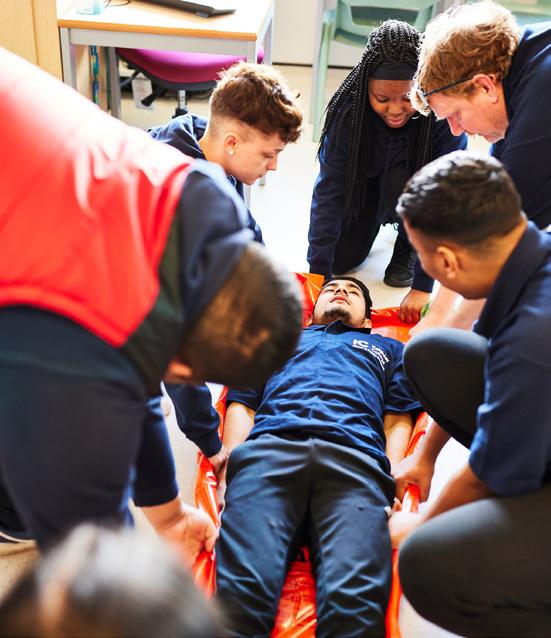Become an Apprentice
Find out how to become an apprentice and what apprenticeships are available.




Find out how to become an apprentice and what apprenticeships are available.



An apprenticeship is a full time job that involves working at a job as an employee. It focuses on gaining hands-on experience and learning for a period of time (often 12-24 months). An apprenticeship can vary in hours, it is full time, 30 hours a week, with a maximum of 40 hours dependant on the role/employer.
Apprenticeships typically include:
80% practical, on-the-job training
This will take place in the workplace and include learning rounded, dedicated skills to your role and industry 20% off-the-job training
With assignments, specific learning and skill-building taught by expert tutors from the college. This might take place in a classroom on campus.
At the end of an apprenticeship, you'll receive a recognised qualification and a portfolio of desirable and relevant skills to help you advance in your chosen industry. In fact, 90% of apprentices stay on in their place of work after their apprenticeship*.


Anyone aged 16 or over can apply for an apprenticeship, regardless of their background in education or employment . All apprenticeship applicants must live in England and not take part in full-time education .
Some apprenticeships may require you to already hold an existing qualification. For example, advanced apprenticeships often require a qualification from an intermediate apprenticeship (or the equivalent) first.
If you benefit from hands-on learning and know the career you want to progress in, an apprenticeship is a perfect alternative to traditional, classroom-based education.

Generally considered to be equivilant to five GCSE passes.
Generally considered to be equivilant to two A level passes.
Level 4 – equivilant to an HNC, a foundation degree, or the first year of an undergraduate degree. Levels 5 and above – equivilant to a full degree.


Equivilant to a full degree.

Intermediate Apprenticeships are equivalent to a junior role within a company. These are for new candidates in the industry and teach the basic skills and knowledge required to progress within a chosen career path.
Examples of job roles include Administrator Assistant, Junior Hair Stylist and Plumber.
An Advanced Apprenticeship builds on the skills and knowledge gained from an Intermediate Apprenticeship. These apprenticeships begin to specialise a candidate’s industry knowledge. They are suitable for people who have previously completed an apprenticeship or have been within a job role for some time.
Examples of job roles include Software Developer, Chef de Partie and Electrical Engineer.
Higher Apprenticeships are for people in senior roles within a company who want to develop their skills to progress further. These apprenticeships are equivalent to completing a foundation degree or Higher National Diploma.
Examples of job roles include Apprentice Teacher, Lab Technician and Project Manager.
Degree or Master's Degree
Apprenticeships are for those who want to be specialists within their field and hold a senior position within a company (such as senior management or technical specialist). These apprenticeships usually involve the undertaking of an under / postgraduate qualification.
Examples of job roles include Managing Director, Laboratory Scientist and HE Lecturer.
Learn, earn and graduate with a recognised qualification
Get your foot in the door to the industry you want
Work with some of the best businesses, right on your doorstep
Develop specialist skills you can only learn on the job
An alternative to A levels, diplomas and degrees with job security ahead
Paid holidays
Increased future earning potential
No debt to pay when completing a higher or degree apprenticeship
Apprentices tend to stay long term with the business that employs them and grows with them



If you're aged 16 to 18, you'll be entitled to the National Minimum Apprentice Wage. Some employers will offer a higher wage than this
If you're aged 19+ and in your first year of an apprenticeship, you'll receive £4.81 per hour
If you're aged 19+ and have finished the first year of your apprenticeship, you can receive the National Living Wage or the National Minimum Wage
It's important to note that these wages are merely the minimum you can earn as an apprentice - many employers offer a competitive salary.

As a quality engineering apprentice, I learn something new every day. To those who are interested in apprenticeships, I would recommend applying for work experience programmes as these help you to narrow down your areas of interest and give you a chance to develop a long term relationship with a company. There are so many opportunities they can offer you that may not be available at university and there is room to progress and build a career.

“My team at Mortgage Advice Bureau have been really supportive throughout my apprenticeship. Everyone is always helping me look for opportunities to progress my career further and to potentially be a mortgage advisor myself in the future. Apprenticeships have taught me that you can progress in your career even while you are still studying. You also get plenty of time to do this work so you aren’t having to do it in your own time.”


Business Services &
Service
Service
Studies
Years
& Building
and
and Joinery
Property Maintenance Operative
Engineering
Engineering Design & Draughtsperson
Fitter
Manufacturing Technician
Operative Standard
Engineering Technician
Technician
Technician
Technician
Support)
and Escalator Electromechanic Engineer
& Operations Engineering Technician
15.3
15.3
39-45
36-39
42-45
15.3
45
42-45
42-45
42-45
36-39
39


You can search our range of apprenticeships on our website and will see available apprenticeships listed as vacancies . The application process for an apprenticeship is similar to a job application, with businesses often having availability for one apprentice at a time .
If you haven't written a job application before, or would like support with writing one, our recruitment team can help you through the process. Alongside support with application and CV writing, they can also guide you on interview techniques, ways
build
and plenty more.


We aim to create the best possible opportunities for all our learners regardless of background, ability or income. We also work closely with our apprenticeship employers to create positive, safer learning experiences that are inclusive and supportive. This includes safeguarding processes, financial support and Disability and Learning Disability support.

Outside of your apprenticeship place of work, you'll have access to a college tutor and our Student Wellbeing team. For any concerns regarding safeguarding, we also have a dedicated safeguarding team to offer all students support.
If you have any questions, would like to know more, or want to speak to a member of our team about this, please get in touch.
If you have any questions, please contact us at or call us on 01426 879 466 apprenticeships@keighleycollege.ac.uk

